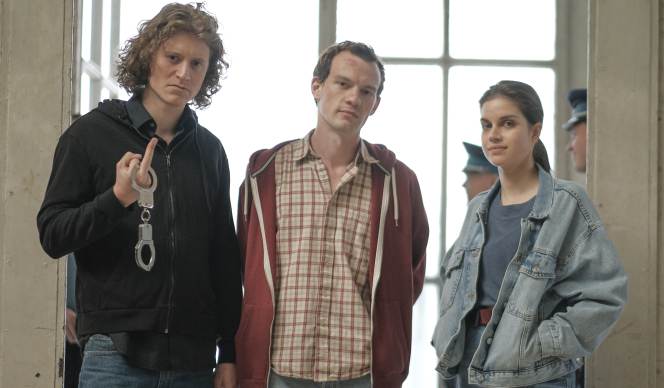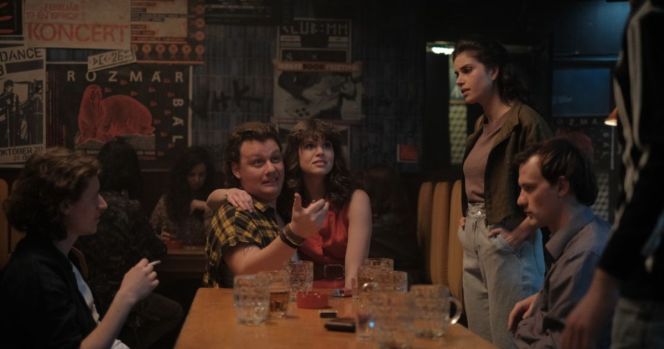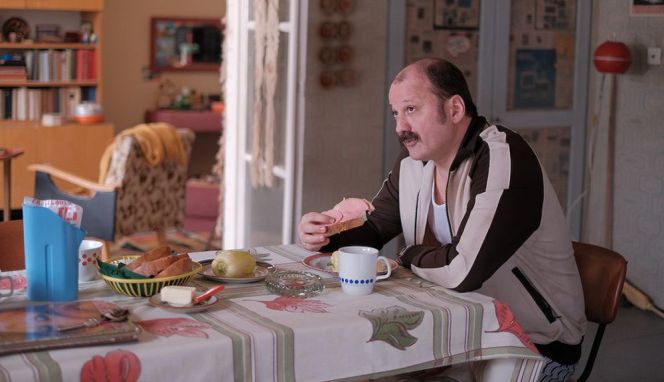SERIES REVIEW – Starting with the cult music of Európa Kiadó’s “Dirty Times”, the new Hungarian series “The Informant”, which has been on HBO Max since April 1st, is a story about the rebellion of the young intellectuals of the 1980s, their fledgling opposition, love, friendship and betrayal. Set in a fictional college in Pest, the story centres on an Informant, a 3/3 agent who regularly reports to state security…
There is perhaps no era whose impact is as significant as the 1980s. The young opposition ‘heroes’ of that era became politicians, and some of them are still in power or close to it. In principle, the change of regime was supposed to have put an end to socialism, but the ‘half-hearted’ way in which this has been achieved in the 30-40 years since then is illustrated by our current political life.
“Informants and Provocateurs” (Kontroll Csoport)
As the title suggests, HBO’s new Hungarian series is about these largely controversial figures (about whom we have since learned various leaked information in connection with the current political debates) and a young Informant. Of course, (unlike the current government’s ‘historical’ – or rather history-faking – propaganda film ElkXrtuk), we do not see specific real people here, but only characters very similar to the real ones.
We could not name the main character of the film, the “Informant”, although, in the past 30 years, many politicians, public figures, media workers, actors and others have been rumoured or proven to have been agents of III/III – including Viktor Orbán, the current Prime Minister of Hungary and the then opposition face of Fidesz, who was also alleged to have been an informant by his former “comrade-in-arms”, Lajos Simicska.
“I see nice, nice, nice faces…” (Informants and Provocateurs – Kontroll Csoport 1983)
We still don’t know for sure what is true or not, which is perhaps why the film series by Bálint Szentgyörgyi, Áron Mátyássy and Bence Miklauzic is not about real people. The story takes place in 1985, when communist Hungary was on the verge of political change. Twenty-year-old Geri (Gergely Váradi) has a heart full of excitement and anticipation; she moves to Budapest to study at the University of Economics. On the first day of her college life, she joins a group of democratic opposition youths who are organising demonstrations against the communist regime. The group is led by Zsolt Száva (Márton Patkós), a charismatic young student who is initially treated with strong suspicion but soon becomes Geri’s best friend. The country boy’s life is changed in an instant by beautiful girls, parties and political debates.
But Geri is hiding a big secret. She is a State Security informant who has no choice: if she wants to keep her seriously ill brother alive, she needs the medicine provided by the state.
While Száva investigates who The Informant in the group is, Geri faces a daily challenge: how to outwit State Security and keep her new friends. With time running out, she must decide whose side she’s on before the final showdown.
“You are not alone; someone is listening all night” (House of Fear – Kontroll Csoport 1983)
Apart from the two main characters, the rest of the cast are colourful, attractive, original characters. We can even speculate about which real-life characters the creators based them on.
Barna (Benjámin Lengyel), Száva’s right-hand man, is a talented footballer whose sporting career is shattered by an incident. He hates cadre kids, including Máté (Varga Ádám), who, through his father, can get anything from the “decadent, decadent” West, whether it’s a VHS tape or ketchup.
Karcsi (Richárd Borbély) is a maths genius who quickly earns the disapproving eye of his teachers with his superior manners and strange dress sense. He is head over heels in love with Panka (Luca Márkus), and their passionate affair is legendary at the College.
The “country’s therapist also plays an important role in the series”, the Kossuth and Jászai Mari Prize winner Pál Mácsai, who plays the role of Kata’s (Júlia Szász) father. Comrade Csaplár (Frigyes Funtek) (The Two Willows of Nagyenyed, The Dreaming, Rendezvous in Budapest), the head of State Security. The “Tartótiszt” (Szabolcs Thuróczy), who recruits and controls the Informant, is a devoted and enthusiastic servant of power. Still, in his private life, he is constantly in conflict with his rebellious daughter. He continuously tries to prove himself and his wife wrong and get a bigger and better apartment in the socialist state.
“Love is here again, and my palms are sweating again…” (Love, love – A.E. Bizottság)
As the series is about young people, it is not lacking in romance and those beautiful girls. Kata (Juliet Szász) is Száva’s girlfriend, who at first resigns herself to her role with him and shows that there is much more to her than meets the eye. Judit (Abigél Szőke), the daughter of the officer in charge (who bears a striking resemblance to Marietta Méhes, whose name is mentioned in a dialogue), is a real rebel, sings alternative songs in an alternative band and thinks of nothing less than her policeman father as a snitch. Finally, there is Adél (Mariann Hermányi) from the KISZ, a real femme fatale: not only is she beautiful, but her sharp wit and sharp tongue also attract Száva’s attention.
It’s clear from the story and characters of The Informant that the creators know the era well and are running the series with a sure hand – at least based on the first five episodes we’ve seen so far before the series actually starts, thanks to HBO Max. At the same time, the storytelling, the presentation, the twists and turns, and everything in The Informant, in general, is entirely modern and up to date for the needs of the present-day – nothing to be ashamed of compared to other foreign series offered by HBO or other streaming channels. The acting is also generally okay, although one or two youngsters in certain scenes are a bit theatrical or forced. However, this is a common occurrence in Hungarian productions and relatively rare here compared to others.
“Deliver Me From Evil” (Europa Publishing)
Some of the characters’ characterisation is well developed but not always very sophisticated. For example, the two main characters, Geri and Száva, are complex and interesting: Geri is innocently forced to become a snitch, but – if the fact that he is a snitch is put aside – his methods are questionable even beyond that later on, and he may take advantage of her ‘privileged’ position in some ways. Száva is a great rebellious young intellectual, the ambitious leader of the group, but he is also extremely arrogant and arrogant, and in certain situations, he can be pretty stupid, and Geri takes him by the nose with relative ease. They, and the other rebellious youngsters, are complex individuals, and the filmmakers have not made the mistake of worshipping them.
Unfortunately, for the antagonists on the other side – and especially for the officer in charge of the Reservoir – the same subtlety of characterisation can be said to a much lesser extent. In particular, the Officer is the most unlikable character in the series, which is understandable on the one hand. Still, on the other hand, he is a much more straightforward and well-developed antagonist than one would expect from a similar character in a modern HBO or Netflix series. The realities of the 1980s were not so black and white, and it would have been expected that the ‘main villain’ would be a little more complex – perhaps one of the most significant flaws of The Informant.
“Does fashion tell you who you are? ” (Brék(Cinema) – Neurotic)
Despite its minor flaws, The Informant is not only a bright spot for the current streaming channels and television stations, which are full of foreign series or Hungarian series that mainly serve public taste but also a quite decent and fair chronicle, which is also really twisty and entertaining. Although it may not always be up to the standards of foreign series in terms of acting, storytelling or more elaborate antagonists, on the whole, it will be fun for those who are not so interested in the eighties and for those who are (and perhaps lived in that era), The Informant is a must streaming series.
-BadSector-
The Informant
Direction - 8.2
Actors - 7.8
Story - 8.4
Visuals/Music/Sounds - 8.5
Hangulat - 8.2
8.2
EXCELLENT
Despite its minor flaws, The Informant is not only a bright spot for the current streaming channels and television stations, which are full of foreign series or Hungarian series that mainly serve public taste but also a quite decent and fair chronicle, which is also really twisty and entertaining. Although it may not always be up to the standards of foreign series in terms of acting, storytelling or more elaborate antagonists, on the whole, it will be fun for those who are not so interested in the eighties and for those who are (and perhaps lived in that era), A besúgó is a must streaming series.





















Leave a Reply